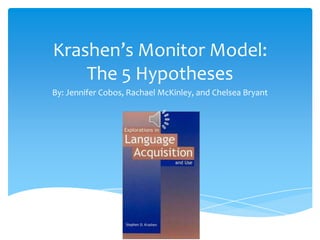
Group presentation krashen’s 5 hypotheses
- 1. Krashen’s Monitor Model: The 5 Hypotheses By: Jennifer Cobos, Rachael McKinley, and Chelsea Bryant
- 2. Krashen Biography Professor Emeritus at the University of Southern California Linguist, educational researcher, and activist Has published more than 350 papers and books Introduced the concept of 5 learning hypothses
- 3. The 5 Hypotheses The 5 hypotheses are about the learning of a second language The 5 hypotheses are as follows: Acquisition Learning Hypothesis Natural Order Hypothesis Input Hypothesis Monitor Hypothesis Affective Filter Hypothesis
- 4. The Acquisition-Learning Hypothesis Two Methods to Learning a second language: Learning Acquisition
- 5. Learning Conscious study of the language According to Krashen, this does not lead to fluent speaking Ex: In China after multiple hours of studying English grammar, students were unable to engage in meaningful conversation
- 6. Acquisition Picking up language the way children naturally do Subconscious Ex: Picking up language through meaningful conversations that they observe and eventually engage in
- 7. What does this mean? The point of Krashen’s “Acquisition Learning” hypothesis is to show that though alone neither learning or acquisition are successful, when used together they can produce real results in English proficiency
- 8. The Monitor Hypothesis “Conscious learning is available only as a "Monitor," which can alter the output of the acquired system before or after the utterance is actually spoken or written. It is the acquired system which initiates normal, fluent speech utterances.” • Internal grammar editor, or “Monitor” • Implies that the ELL thinks about what they say or write, and has the ability to “self-correct”
- 9. Example of the Monitor Hypothesis I goed to the store… I mean…. I went to the store.
- 10. The Monitor Hypothesis Keys to Effective Monitoring • Time • An ELL must have sufficient time to think about and use rules consciously • Focus on grammatical form • Even with ample time, one may be so involved in what they’re saying they don’t think about how they’re saying it • Knowledge of rules • Complex
- 11. The Monitor Hypothesis Types of Monitor Users • Under-user • • Have not learned Or, prefer not to use knowledge • Over-user • • Constantly monitoring No fluency • Optimal User • • Uses Monitor when appropriate Uses learning as a supplement to acquisition
- 12. Natural Order Hypothesis Language learners acquire (rather than learn) the rules of a language in a predictable sequence Acquisition of grammatical structures follows a natural order
- 13. Teacher Application Be aware that certain structures of a language are easier to acquire than others Start by introducing language concepts that are relatively easy for learners to acquire and then use scaffolding to introduce more difficult concepts
- 14. Input Hypothesis Second language acquisition is the direct result of learners’ understanding the target language in natural communication situations
- 15. Input Hypothesis cont. learners progress in their knowledge of the language when they comprehend language input that is slightly more advanced than their current level “i” is the language input “+1” is the next stage of language acquisition
- 16. Four Parts to the Input Hypothesis 1. Relates to acquisition, not learning 2. We acquire by understanding language that contains structure beyond our current level of competence 3. When communication is successful, when the input is understood and there is enough of it, i+1 will be provided automatically 4. Production ability emerges. It is not taught directly.
- 17. The Affective Filter Hypothesis “People acquire second languages when they obtain comprehensible input and when their affective filters are low enough to allow the input in [to the language acquisition device].” • Addresses the relationship between social-emotional variables and second language acquisition • The goal is to have a weak affective filter (low anxiety).
- 18. The Affective Filter Hypothesis • Low-anxiety learning environment • Motivation to learn language • Self-confidence • Self-esteem Most Important Affective Variables
- 19. Lowering the Affective Filter Get to know your students Lots of praise Encourage all expressions of English Incentives Interesting topics
- 20. Questions 1. How do you think a high-stress environment affects an ELL trying to acquire a second language? 2. How do you think the population of other ELL students (high versus low) affects the learning of English in schools? 3. Can you describe three activities that promote second language acquisition?
- 21. Conclusion Krashen’s Monitor Model and 5 hypotheses are all a model of teaching for the learning of a second language They are all based off of the natural way a first language is learned
- 22. Works Cited Fortin, Katherine. (2009, Nov. 13) Teaching Foreign Languages: Make Your Students Feel At Ease. Retrieved from http://www.youtube.com/watch?v=B0B0KWqGMI Krashen, S.D. (1981) Second Language Acquisition and Second Language Learning, Pergamon Press, Inc. Retrieved from http://sdkrashen.com/content/books/sl_acquisition_and_learning.pdf Krashen, S.D. (1982) Principles and Practice in Second Language Acquisition, Pergamon Press, Inc. Retrived from http://www.sdkrashen.com/content/books/principles_and_practice.pdf Peregoy, S. & Boyle, O. (2013) Reading, Writing, and Learning in ESL: A Resource Book for Teaching K-12 English Learners (6th Ed). Upper Saddle River, NY: Pearson Education, Inc.
